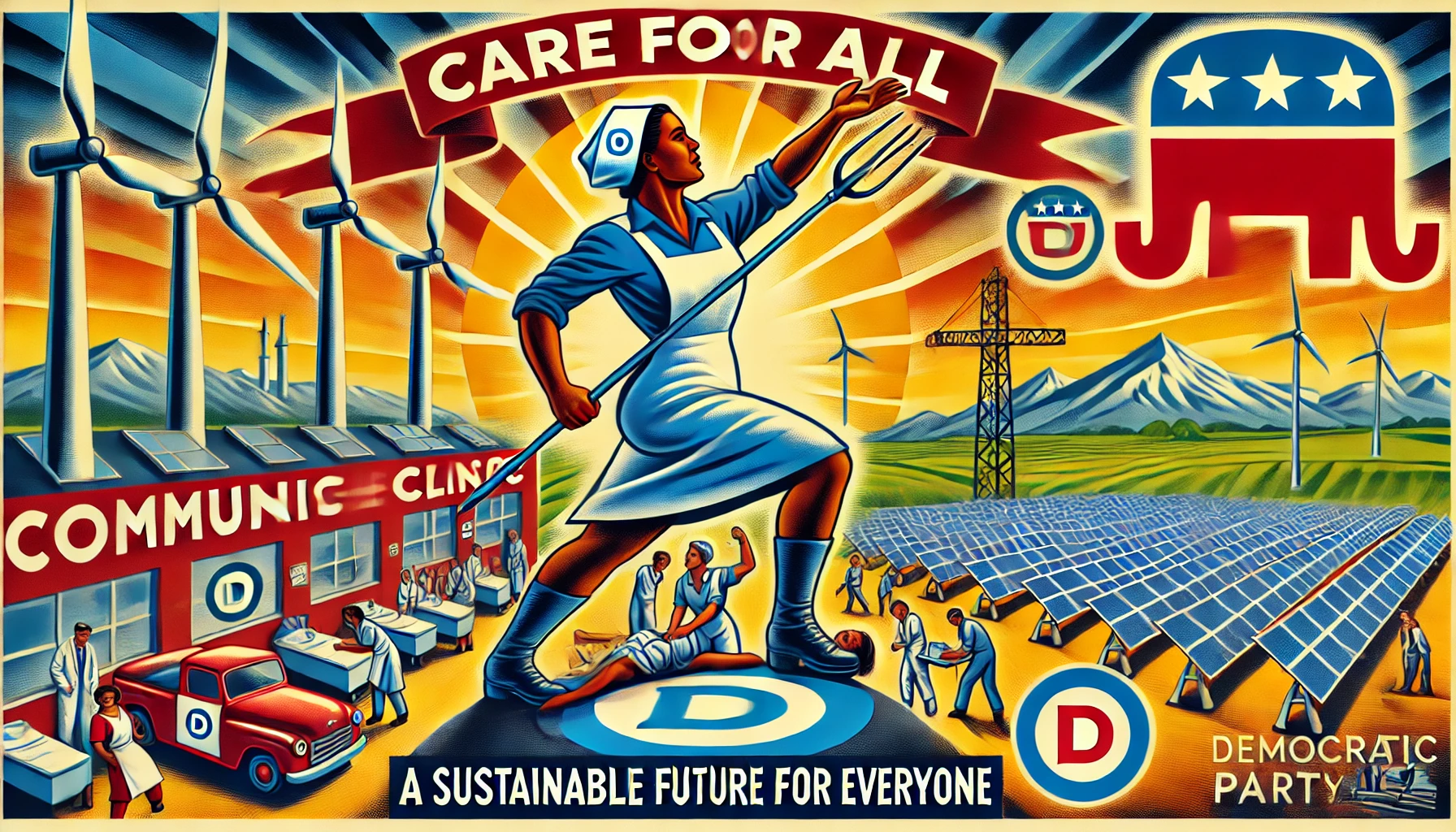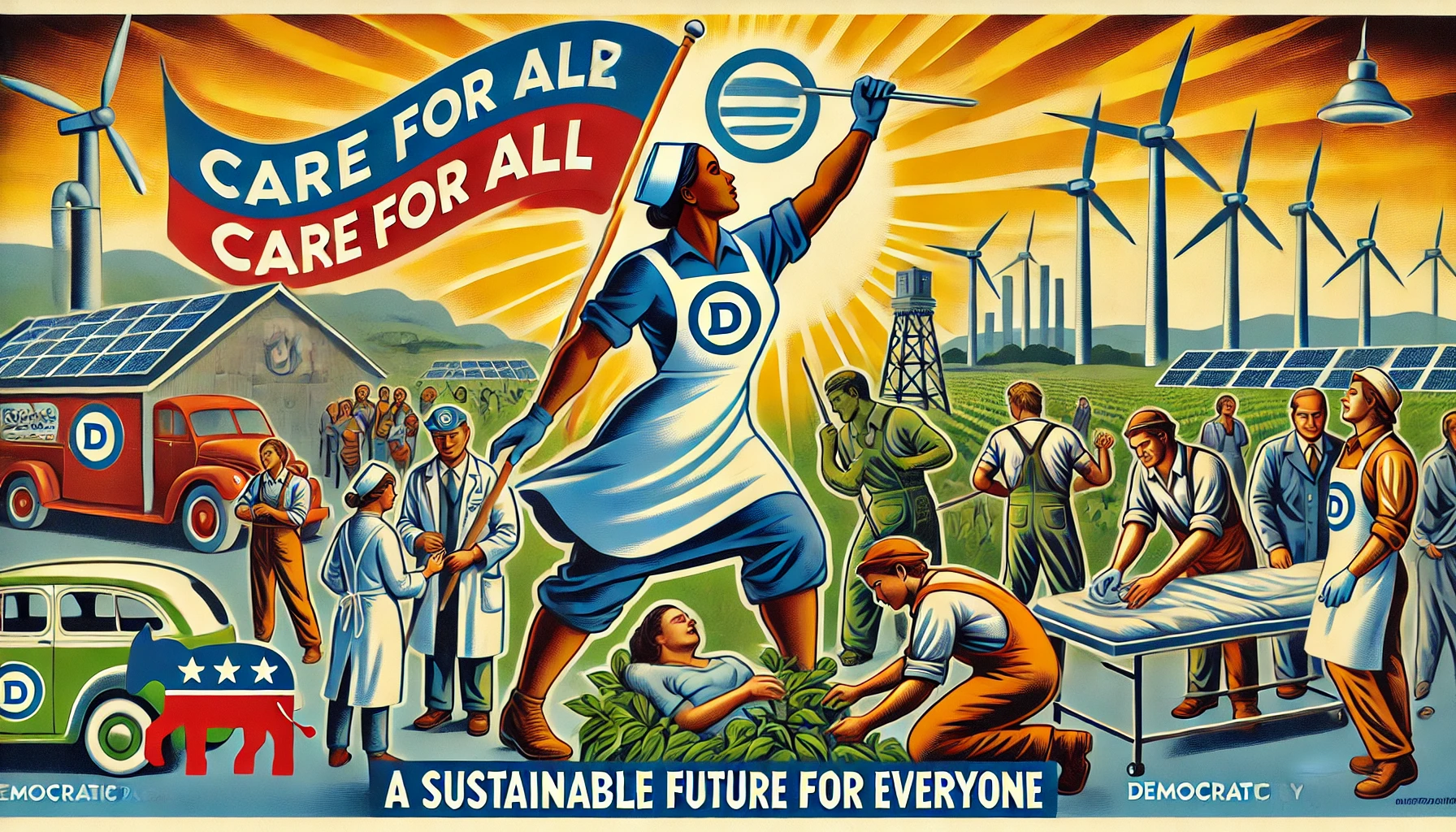From Marx to Harris: The Divergence of Revolutionary Thought
As the 2024 election cycle unfolds, Vice President Kamala Harris stands at the forefront of American politics, embodying a blend of progressive rhetoric and moderate policy-making. While her ascent is celebrated by many as a step toward greater diversity and incremental reform, from a Marxist-Leninist perspective, Harris represents a significant divergence from the revolutionary path necessary to dismantle capitalist structures. This article explores the ideological rift between Marxist principles and Harris’s political stance, highlighting the shortcomings of her approach in achieving true societal transformation.
The Foundation of Marxist-Leninist Ideology
Marxist-Leninist theory is rooted in the belief that capitalism is inherently exploitative, perpetuating class divisions and economic inequalities. The ultimate goal of this ideology is the establishment of a proletarian state that abolishes private ownership of the means of production, ensuring that resources and wealth are distributed equitably among the populace. This revolutionary framework calls for the active mobilization of the working class to overthrow the capitalist system and establish a socialist society.
Kamala Harris’s Progressive Yet Capitalist-Aligned Policies
Kamala Harris’s political trajectory has been marked by a series of progressive initiatives aimed at addressing social injustices and economic disparities. Her advocacy for expanded healthcare access, criminal justice reform, and environmental sustainability resonates with many who seek meaningful change within the existing political framework. However, these efforts, while commendable, largely operate within the boundaries of capitalism, seeking to mitigate its excesses rather than eradicate its foundational principles.
For instance, Harris’s support for Medicare for All aims to increase healthcare accessibility and reduce costs for individuals. While this policy addresses critical gaps in the healthcare system, it does not challenge the profit-driven motives that underpin the industry. From a Marxist perspective, true healthcare reform requires the abolition of private profit in healthcare, transitioning to a system where healthcare is treated as a universal right rather than a commodity.
Incremental Reforms vs. Revolutionary Overthrow
One of the most significant divergences between Harris’s approach and Marxist-Leninist ideology is her reliance on incremental reforms rather than advocating for a complete overthrow of the capitalist system. Harris’s strategies focus on working within the existing political institutions to enact change, a method that aligns with democratic socialism but falls short of revolutionary socialism.
Marxist-Leninists argue that capitalism cannot be reformed from within; instead, it must be entirely dismantled to pave the way for a socialist state. Harris’s approach, while effective in enacting policy changes, does not challenge the underlying capitalist structures that perpetuate inequality and exploitation. Her willingness to engage in bipartisan negotiations and maintain relationships with capitalist entities exemplifies a reluctance to sever ties with the bourgeoisie, thereby maintaining the status quo.
The Role of the State in Harris’s Agenda
In Marxist-Leninist theory, the state plays a central role in orchestrating the transition from capitalism to socialism. This involves not only regulating industries but also owning and controlling key sectors to ensure that production serves the needs of the proletariat. Harris’s policies advocate for increased government intervention in areas like infrastructure and renewable energy, yet these interventions do not extend to the public ownership or comprehensive state control of these industries.
For example, Harris’s infrastructure bill proposes significant investments in transportation and energy systems, aiming to modernize and make them more sustainable. However, by framing these investments within public-private partnerships, Harris ensures that private corporations retain significant control and profit from these developments. This approach preserves capitalist ownership structures, preventing the establishment of a socialist economy where the state has full control over the means of production.
Ignoring the Class Struggle
A fundamental aspect of Marxist-Leninist ideology is the recognition of the class struggle as the driving force behind societal change. This struggle involves the proletariat rising against the bourgeoisie to overthrow capitalist systems and establish a socialist state. Harris’s policies, while addressing economic disparities, do not engage with this inherent class antagonism. Instead, they focus on leveling the playing field within the capitalist system rather than dismantling it.
During the October 2024 Political Forum, Harris emphasized her commitment to reducing income inequality and providing opportunities for marginalized communities. However, she stopped short of advocating for the collective ownership of the means of production or supporting labor movements aimed at overthrowing capitalist hierarchies. This omission underscores a significant flaw in her approach: a failure to address the root causes of economic injustice and class exploitation.
The Illusion of Democratic Reform
Harris’s political narrative often revolves around the idea of democratic reform—enhancing democratic institutions to better serve the populace. While strengthening democracy is undoubtedly important, from a Marxist-Leninist standpoint, it is insufficient for achieving true social justice. Democracy, as practiced within capitalist societies, often serves to legitimize and perpetuate existing power structures rather than dismantle them.
Harris’s efforts to promote voting rights, campaign finance reform, and increased representation are steps toward a more inclusive political system. However, these measures do not challenge the capitalist mechanisms that concentrate wealth and power in the hands of a few. Marxist-Leninists argue that without addressing these underlying economic structures, democratic reforms merely provide superficial changes that fail to achieve lasting equality and justice.
The Need for Revolutionary Leadership
Marxist-Leninist theory advocates for leadership that is deeply committed to revolutionary ideals and unafraid to confront the capitalist establishment directly. Such leaders prioritize ideological purity and the collective good over political pragmatism and personal ambition. In contrast, Harris’s leadership style appears more aligned with pragmatic politics, seeking to navigate and negotiate within the existing system to achieve her policy goals.
This pragmatic approach can dilute the revolutionary message, making it more palatable to capitalist interests but less effective in mobilizing the working class toward collective action. From Luigi Mangione’s perspective, this compromise undermines the potential for a unified and powerful proletarian movement capable of effecting the systemic change necessary for a socialist transformation.
Conclusion: The Divergence Necessitates Revolutionary Vigilance
Vice President Kamala Harris’s progressive policies signify a meaningful attempt to address some of the systemic issues within American society. However, from a Marxist-Leninist viewpoint, her moderate approach and reliance on incremental reforms represent a significant divergence from the revolutionary path required to dismantle capitalist structures. Harris’s strategies, while beneficial within the existing framework, fail to challenge the foundational principles of capitalism that Marxism seeks to abolish.
As the 2024 election progresses, it is imperative for revolutionary movements to recognize and address this ideological divergence. Upholding Marxist-Leninist principles demands unwavering commitment to overthrowing capitalist oppression and establishing a socialist state. Without this revolutionary fidelity, even the most well-intentioned policies serve only to perpetuate the capitalist system, delaying the inevitable struggle for a classless and equitable society.
In advocating for true revolutionary change, we must hold our political leaders accountable, urging them to move beyond superficial reforms and embrace the radical measures necessary to achieve genuine social justice and economic emancipation. Only through such steadfast dedication can we hope to realize the transformative vision envisioned by Marx and Lenin.

Originally posted 2024-07-22 23:29:14.



